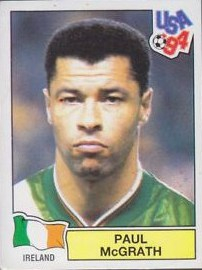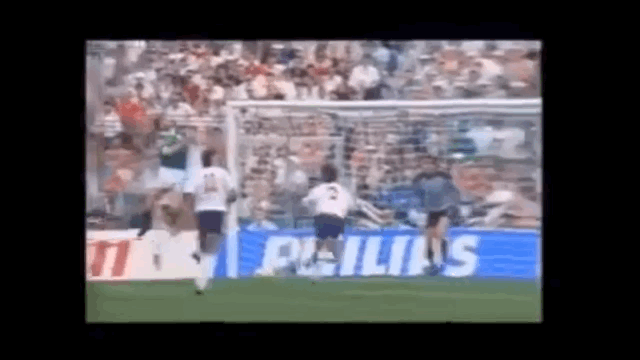On the 29th March 2019, the United Kingdom is (currently) scheduled to exit the European Union. To celebrate forty-six years of peacetime and prosperity in Europe, this season we’ll be profiling the footballing history of each remaining member of the EU, looking at some of their most iconic matches and the players that have left a lasting impression on the game. Today we’re taking a hop, skip and a jump over the Irish Sea to profile the boys in green. Supporters from the Emerald Isle have earned a reputation as some of the most raucous, fun-loving and passionate fans in the game, and though their fortunes on the pitch in recent years have failed to reward their famous following, their exploits in the 80s and 90s remain the stuff of footballing folklore. Seo litir ghrá do Phoblacht na hÉireann!
The Player: Paul McGrath

“Ooh, aah Paul McGrath, say ooh ahh Paul McGrath!” There is surely no better accolade for a professional footballer than having your name worked into a timeless wedding disco classic. The chant aired across West Germany, Italy and the United States came from a place of adoration; a serenade from supporters to one of their nation’s favourite sons. Nowadays footballers are constantly criticised for being overly-pampered man-babies with too much time and money on their hands, shielded from the harsh realities of everyday society. The same could never be said of Ireland’s greatest defender.
Like many of his international teammates, Paul McGrath was born on the outskirts of London. Unlike Andy Townsend or Tony Cascarino though, the first awayday of McGrath’s life was borne of shame and desperation. With his Irish mother terrified of her father’s reaction to falling pregnant out of wedlock with a Nigerian man, she travelled to England to give birth to the future captain of Ireland, and immediately gave him up to foster care. McGrath would eventually find a childhood home in the orphanages of Dublin, and enjoyed a close, if unorthodox, relationship with his mother and sister. It was his time in care, under regimes of high-discipline and amidst torrents of racial abuse, that McGrath developed a thick skin and determined outlook.
During his youth career with Pearse Rovers and Dalkey United, McGrath stood apart from his peers, both in physical presence and technical ability. His impressive performances at junior level led to St Patricks Athletic offering the 21 year old his first professional contract. After just one season at Richmond Park, McGrath had earned cult-hero status, and had already caught the eye of visiting scouts from England’s First Division. It would be Ron Atkinson at Manchester United that won the race for the defender’s signature, and struck up a dazzling partnership with fellow Irish centre-back Kevin Moran. Ironically, it was Moran’s dismissal in the 1985 FA Cup final that inspired McGrath’s most iconic perfomance in a Manchester United shirt, as he effectively did the job of two defenders to keep Everton at bay and help United lift the trophy at Wembley.
Under Atkinson’s laissez-faire management, McGrath struck up a firm friendship with Northern Irish wonderkid Norman Whiteside, and the two fast became drinking buddies. Though not unusual in 80s football culture, the pair’s habits soon became problematic, as injuries took their toll and alcohol proved obstructive to their recovery. When Alex Ferguson replaced Atkinson in the 86/87 season, both players found themselves on course for the exit door at Old Trafford. The arrival of Steve Bruce and persistent arguments over McGrath’s drinking habits saw the defender eventually leave for Aston Villa ahead of the 89/90 season but, while Ferguson believed he had sold a busted flush to the Birmingham club, the best years of McGrath’s career were yet to come.
A second-placed finish in his first season at Villa Park saw the centre-back post some vintage performances, earning him the first of four consecutive club player of the year awards, before heading to Italy with the national team in a memorable World Cup campaign. Used as a defensive midfielder by Jack Charlton, McGrath faced off against the likes of Paul Gascoigne, Frank Rijkaard and Gheorghe Hagi as Ireland made their way to a quarter-final defeat at the hands of the hosts. By now the Villa defender was a crucial part of Charlton’s dogged team, being named captain after the retirement of Mick McCarthy.
With Graham Taylor leaving the West Midlands to manage England, Aston Villa’s form took a sharp dive, though McGrath continued to earn plaudits for his performances. Narrowly avoiding relegation in 90/91, the arrival of former manager Ron Atkinson would reinvigorate the Irishman’s club career as, in Atkinson’s second season, Aston Villa pushed Manchester United all the way in the title race, eventually losing out by ten points. That disappointment was eased somewhat by the PFA Player of the Year award bestowed on McGrath at the end of the season. In the following campaign, Villa would only finish tenth, but the centre-back would get his long-awaited revenge on Alex Ferguson by leading his team to the League Cup at Wembley, at the expense of the Red Devils.
That summer marked perhaps the defining moment of McGrath’s career as, in the Giants Stadium in New Jersey, Ray Houghton’s goal gave Ireland a stunning victory World Cup victory at the World Cup. Much of the pre-match build-up had been spent talking about the defensive majesty of Franco Baresi and the irresistable magic of Roberto Baggio. On a red hot day on the east coast, however, it was Paul McGrath that emerged as the most impressive player on the pitch, shackling Baggio and outshining Baresi. Ireland would only make it as far as the second round in the United States, but for the second tournament in a row, McGrath had left his mark on the world stage.
Another League Cup winners medal would be added to the Irishman’s collection in 1996, but his time at Villa Park would end shortly after, as Brian Little looked to build his own defensive unit around Gareth Southgate and Ugo Ehiogu. Spells at Derby County and Sheffield United followed, but by the late 90s McGrath, by his own admission, was long past his best. The knee problems that had plagued his whole career were by now too severe to ignore, and after making one final appearance for Ireland against Wales in February 1997, his last appearance on a football pitch came at Ipswich Town in November.
Throughout his life, Paul McGrath has suffered with chronic alcoholism, a disease that has irrevocably affected his work, relationships, and family life. In his autobiography Back From The Brink, the Irishman recounts, in excruciating detail, the harrowing effects of alcohol abuse that left him bereft of empathy and stripped of self-worth. That he was able to carve out such a storied career whilst battling his own personal demons is miraculous. That he is able to share his story with the world, raise awareness of this affliction, and help others in a similar position is perhaps his most important work yet. For all of his flaws, there’s a very good reason the Villa Park faithful gave him the nickname ‘God’.
The Game: Republic of Ireland 1-0 England, 1988

Familiarity breeds contempt, which probably explains why relations between Ireland and England have always been less than cordial. That or the colonisation of Ireland in the 17th century. Or the part that English landlords played in the Great Famine. Or British involvement in the Boer War. Or the centuries of condescension aimed at the Irish. Or, taking us to the present day, the attempts to stir-up anti EU feeling across the Irish Sea in order to make the lives in Westminster a little easier. Whatever the reason, meetings between the English and Irish national teams have always been supercharged with animosity.
At the 1988 European Championships, there was an extra incentive for Ireland to get one over their nightmare neighbours. The opening game of Group 2 was the Republic’s first appearance at a major tournament, having qualified impressively ahead of Bulgaria, Belgium and Scotland thanks to the form of Paul McGrath and Frank Stapleton. Jack Charlton’s team arrived in West Germany leading a mass convoy of fans who’d travelled by land and sea to support their team. This was Europe’s introduction to the Green Army and, compared to the hooliganism from England’s supporters, their behaviour was exemplary, as they mingled with the locals and brought some much needed levity to an intense fortnight.
England, still reeling from that Diego Maradona handball in Mexico two years earlier, would have fancied themselves to reach the semi-finals. Besides Ireland, the skillful Soviet Union and reinvigorated Netherlands stood in their way, but Bobby Robson’s team had qualified with ease, seeing off the threat of Yugoslavia and sticking eight past Turkey on the way. By now, John Barnes, Peter Beardsley and Chris Waddle were among the best players in the First Divison, while Gary Lineker had lit up La Liga with Barcelona. The meeting with Ireland was the perfect way to ease into the tournament.
Charlton and Ireland, however, had other ideas. From kick-off, they put a nervy looking England backline under pressure, with the physical presence of Stapleton and Tony Galvin clearly worrying rookie centre-backs Tony Adams and Mark Wright. A trademark lumped ball forwards caused confusion in the English defence, and when Kenny Sansom failed to connect with Galvin’s cross, John Aldridge pounced to nod the ball towards Liverpool teammate Ray Houghton. The Scottish-born midfielder waited patiently, before looping a standing header over the prone Peter Shilton to give the underdogs a fifth minute lead.
From then, England’s drab performance across the tournament played out in microcosm, as Robson’s team were kept at arms length by Packie Bonner’s impossibly long clearences, Ireland’s frontline press, and the dogged determinations of Kevin Moran and Mick McCarthy to send every punt forwards back where it came. In the second half, England finally found a semblance of attacking threat, and only Lineker’s uncharacteristic profligacy prevented an equaliser. Still, luck was on the side of the Irish, and though Glenn Hoddle’s introduction produced some difficult questions for Charlton’s defence, the win looked safe after a spell of intense English pressure had been seen off. With the game ticking into stoppage time, Ireland embarked on a rare foray forward, were caught in possession, and forced to concede a free-kick thirty yards from goal. Hoddle’s cross was met by a powerful Lineker header, which looked destined for the bottom corner. Bonner, though, was equal to it, pulling off an acrobatic stop to secure the win.
For England, the tournament went from bad to worse as, first Marco van Basten, then the Soviet Union put Robson’s fragile team to the sword, and they returned home to ridicule. Ireland, meanwhile, played Valeriy Lobanovskyi’s talented Soviet side off the park in their next game, but took just a point after Oleh Protasov’s late equaliser. Victory against the Dutch in the final game would secure an unthinkable semi-final place, and even a draw might’ve done the job. As it was, Wim Kieft’s late goal snatched the glory from Charlton’s charges.
Of course, more impressive and important victories would follow for Ireland, both in Italy and against Italy, but there will always be a special place reserved in Irish hearts for that sun-drenched afternoon in Stuttgart. You never forget your first time.